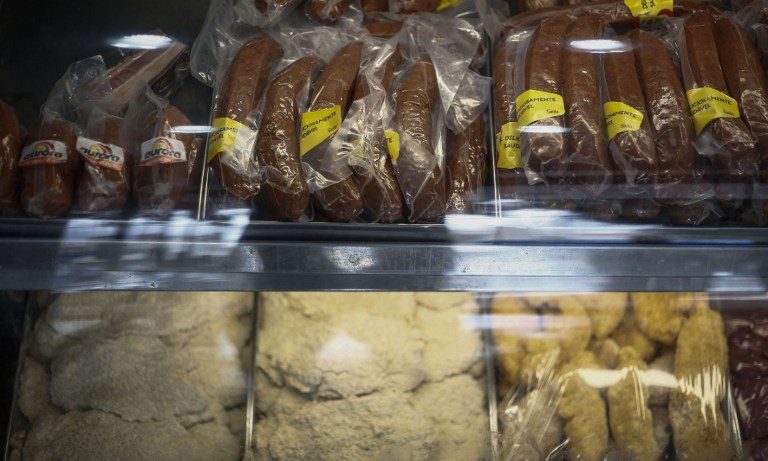SUMMARY
This is AI generated summarization, which may have errors. For context, always refer to the full article.

BRASILIA, Brazil – The fallout from Brazil’s rotten meat scandal accelerated Monday, March 20, when China, a huge client, suspended imports and the European Union demanded a partial ban.
Another ban on Brazilian meat imposed by Chile sparked fears of a trade spat between the two South American partners.
A charm offensive by President Michel Temer, who even invited foreign ambassadors to a traditional meat restaurant in the capital Brasilia late Sunday, March 19, failed to calm importers.
China, which with Hong Kong is Brazil’s biggest meat export market, said it needed to know more about the allegations that major meatpacking businesses bribed inspectors to get health certificates and masked tainted meat as fit for consumption.
“Until it receives more information, China will not unload meat imported from Brazil,” the Brazilian agriculture ministry said.
It said Brazilian Agriculture Minister Blairo Maggi will hold a videoconference late Monday with Chinese authorities to offer “clarifications.”
“We expect more than 30 countries to question Brazil about this issue,” Maggi told a news conference.
If all of them halt imports of Brazilian meat, it will be catastrophic for the country, the minister said.
The European Commission, the EU executive arm, called on Brazil to immediately halt exports by 4 companies implicated in the scandal, the bloc’s spokesman Enrico Brivio told reporters in Brussels.
Shortly after, the Brazilian government said it had complied, halting exports by all 21 meat processors under investigation.
But after Chile announced a “temporary” ban on Brazilian meat products, Maggi angrily threatened reprisals.
“We are major importers of Chilean products: fish, fruit and other products, and Brazilians demand that we should erect barriers. Trade is like that,” Maggi said.
South Korea, for its part, suspended distribution of chicken already imported from Brazil to inspect it for safety. But it has no plans to close its market to Brazilian meat, the South Korean embassy in Brasilia said.
At least 30 people have been arrested in the scandal, with Brazilian police raiding more than a dozen processing plants.
A poultry-processing plant run by the multinational BRF group and two meat-processing plants operated by the local Peccin company were shut down, the agriculture ministry said.
New blow for Brazil
Brazil is the world’s biggest beef- and poultry-exporting nation and the row is especially unwelcome when the country is struggling to overcome its worst recession in history.
Market analysis group Capital Economics warned the scandal over Brazil’s meat exports could derail the country’s economic recovery.
“Brazil is facing a potential loss of export revenues of about $3.5 billion. That’s the equivalent of about 0.2% of GDP,” Capital Economics said.
“The economic impact will depend to a large extent on how long any bans stay in place. There are some reasons for optimism here.”
Officials are arguing that there is no systemic corruption or health problem in the meat industry and that the police operation uncovered only a few bad apples.
“Agribusiness is extremely important for us in Brazil,” Temer said in an address Monday. “It cannot be discredited just because of a small group.”
The scandal also broke just days before the start of negotiations to seek a free-trade accord between the European Union and several South American countries including Brazil.
Brazilian meat is exported to more than 150 countries, with principal markets also including Japan, Saudi Arabia and Russia.
Sales in 2016 reached $5.9 billion in poultry and $4.3 billion in beef, according to Brazilian government data. Total meat exports amount to about seven percent of exports and 0.7 percent of gross domestic product, according to Capital Economics.
France and other European countries are wary about opening up the EU meat market to countries in the South American Mercosur bloc, which includes major exporters Brazil and Argentina. Paraguay and Uruguay are the other members. – Rappler.com
Add a comment
How does this make you feel?
There are no comments yet. Add your comment to start the conversation.